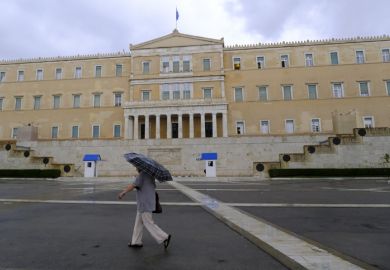Legislation enabling private universities to operate in Greece will deliver “significantly positive results” and limit the flow of Greek students to overseas institutions, the country’s education minister has insisted.
Speaking to Times Higher Education, Kyriakos Pierrakakis said the education law, which was passed in March amid mass student protests, would facilitate the “opening up of the Greek university system”.
The legislation allows private institutions that meet certain criteria to issue degrees equivalent to those from public universities. International institutions, meanwhile, will be able to open branches in Greece, charging tuition fees while maintaining a non-profit status.
Private universities have long been a contentious subject in Greece. Article 16 of the country’s constitution holds that “art and science, research and teaching shall be free”, while “the establishment of university-level institutions by private persons is prohibited”. When the recent law was first tabled in parliament, opposition MPs across five parties submitted objections regarding its constitutionality.
Opposition party Syriza further argued that the bill could create a two-tier system favouring the wealthy, with lawmaker Harris Mamoulakis commenting: “Whoever has money will study: the power of privilege.” An estimated 18,000 students protested outside parliament against the bill.
Yet Mr Pierrakakis, who served as minister of digital governance before taking up his current role last year, told THE that the new law was “fully commensurate with the constitution” because it “does not touch upon the foundation of new entities but actually allows for the location of chapters of existing universities within Greece”.
The prohibition of private universities “had a symbolic nature” in Greece, Mr Pierrakakis said. “I think it’s important for governments and politicians to show that certain totemic policies which have remained in our country for decades, if they’re considered to be non-productive, we should have the courage to break them or change them,” he said.
Greece has a vast academic diaspora, with more than 40,000 students currently enrolled overseas. The new law, Mr Pierrakakis said, would help to “render the country an educational centre” and “address the number of Greeks who are leaving the country in order to study abroad because they cannot have their educational destinies fulfilled domestically”.

While the facilitation of private universities attracted the most headlines, the minister said, “85 per cent of the content of the law touches upon institutional changes in public universities”.
Alongside “breaking the state monopoly on higher education”, he said, the law had two other central goals: to allow for the establishment of joint master’s programmes between Greek public universities and “internationally renowned” overseas universities, and to grant international students “easier access to the Greek higher education system for brief periods of study”.
Pointing to the redirection of many international students who would once have studied in the UK to countries such as the Netherlands in the wake of Brexit, Mr Pierrakakis said Greece could have benefited from this opportunity had reforms been established earlier.
“I see Greece as a very interesting educational proposition, should we fix our perennial problems,” the minister said. “To use an analogy from my previous job, we have had the hardware for decades, but we lacked the software. With this new institutional approach, we are trying to install new software.”
Register to continue
Why register?
- Registration is free and only takes a moment
- Once registered, you can read 3 articles a month
- Sign up for our newsletter
Subscribe
Or subscribe for unlimited access to:
- Unlimited access to news, views, insights & reviews
- Digital editions
- Digital access to THE’s university and college rankings analysis
Already registered or a current subscriber?








